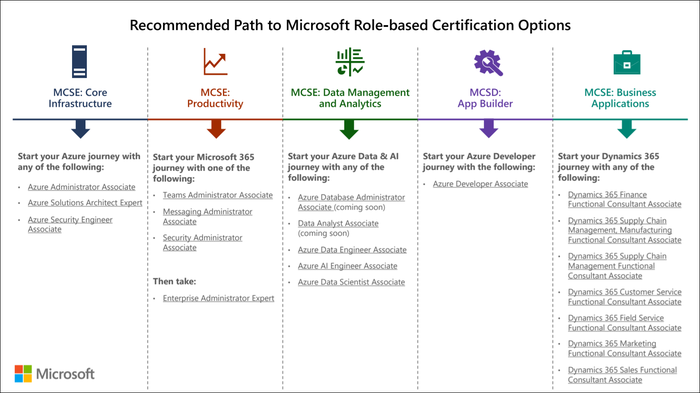Microsoft Proficiency Anchored by Cloud CertificationsMicrosoft Proficiency Anchored by Cloud Certifications
Over the last couple of years, Microsoft has been rolling out new training and cloud certifications that center around specific IT roles rather than broad job descriptions. This work has reached the stage where 15 traditional certifications and nearly 45 associated exams will be retired in June.

Digital transformation has been in the lexicon of enterprise companies for a few years now. Some have made that move without hesitation, others might be held back due to regulation or cost. The move to the cloud has been coming for quite a few years and now major tech companies are shifting their qualification programs in this direction. Cloud certifications will become more critical for IT pros and system administrators as the cloud becomes the default base for a business’s operations.
Microsoft began a move towards changing their certification programs to a role-based approach in September 2018. This change, announced at Microsoft Ignite 2018, has been ongoing for 18 months and a recent announcement confirms the shift to these role-based certifications will leave behind 15 traditional certifications and nearly 45 qualification exams for those certifications.
The move to role-based qualifications will allow IT pros and system administrators to continue a steady path of expertise growth through a series of fundamental, associate and expert qualifications. Not surprisingly, the move to more cloud-based services dominates these new levels with Microsoft cloud certifications covering many of the new skills.

microsoft-role-based-cert-options
Currently, there are more than 30 role-based certifications and training opportunities under the new program across the fundamental, associate and expert levels.
Role-based cloud certifications begin in these fundamental areas:
Power Platform
Dynamics 365
Microsoft 365
Azure
From these fundamental role-based entry points, individuals can advance their qualifications into associate, expert and specialty areas. The entire listing and roadmap for each certification is available at the Microsoft Learn website. In addition, by using what Microsoft calls Learning Paths, it is a very straight forward, step-by-step process to learn the material necessary to eventually prepare for and take a final certification exam to earn credentials in that role.
Microsoft’s current three-level certification program – i.e. the one that’s being phased out – covers a broad range of skills and expertise at each level:
Microsoft Certified Solutions Associate (MCSA)
BI Reporting
Microsoft Dynamics 365 for Operations
Office 365
SQL 2016 BI Development
SQL 2016 Database Administration
SQL 2016 Database Development
SQL Server 2012/2014
Web Applications
Windows Server 2012
Windows Server 2016
Microsoft Certified Solutions Developer (MCSD)
App Builder
Microsoft Certified Solutions Expert (MCSE)
Business Applications
Core Infrastructure
Data Management and Analytics
Mobility
Productivity
These certifications are also hierarchical, and the initial levels are usually required to earn the higher-level qualifications.
Microsoft is not the only big tech company shifting their qualification and learning programs to focus on cloud certifications.
Google recently announced that partners had achieved more than 70 specializations in the last quarter of 2019 across the company’s cloud certifications. Amazon continues to provide an extensive list of Amazon Web Services certifications for their customers.
Just like Microsoft, these are role-based certification programs, confirming the industry trend towards specializing by IT pros and system administrators across different companies. In a multi-cloud environment this can be very useful compared to obtaining a broad portfolio of skills under one company’s architecture.
Update (March 27, 2020): Due to the COVID-19 coronavirus situation, Microsoft has delayed the retirement of these certifications until January 31, 2021.
Read more about:
MicrosoftAbout the Author
You May Also Like
.jpg?width=100&auto=webp&quality=80&disable=upscale)
.jpg?width=400&auto=webp&quality=80&disable=upscale)






.jpg?width=700&auto=webp&quality=80&disable=upscale)
